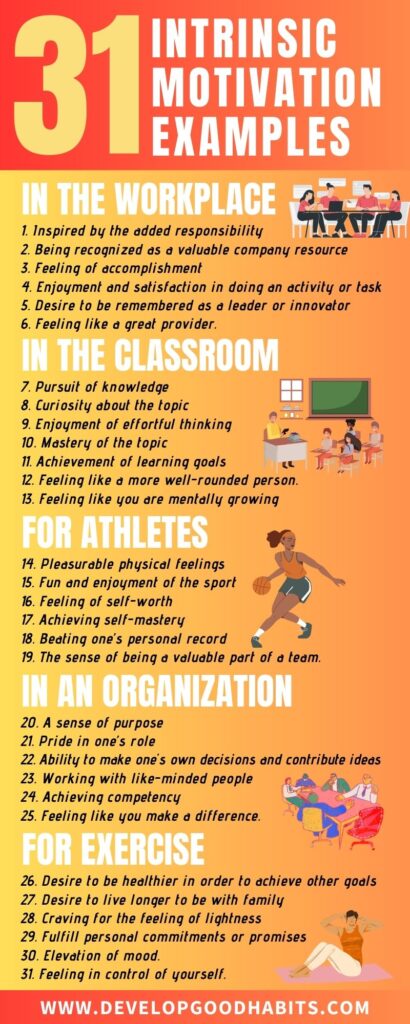There might be affiliate links on this page, which means we get a small commission of anything you buy. As an Amazon Associate we earn from qualifying purchases. Please do your own research before making any online purchase.
Have you ever thought about why you do the things you do? What is it that really prompts your motivated behavior? Motivation can be either extrinsic or intrinsic, meaning it can come from outside or inside of a person.
Extrinsic motivation comes when you feel the urge to do something in order to gain a specific reward or steer clear of punishment.
An example of this would be working hard on a paper to get a good grade or practicing a sport to win an award. Or maybe you go to work every day just to get that paycheck at the end of the month. (Read more about extrinsic motivation examples here.)
No matter what the reward is, it is coming from an exterior source, and you are chasing something very specific.
Alternatively, intrinsic motivation is when you do something because the process is personally rewarding. While you don't have a tangible goal in mind, you may just enjoy playing a sport or working on a puzzle.
You simply enjoy doing what you are doing. You may have small victories along the way, but you would be doing whatever you are doing regardless of what you get out of it, simply because you like doing it.
The Difference Between Intrinsic Motivation and Extrinsic Motivation
Intrinsic motivation is the desire to do something even if there isn’t an obvious reward. Intrinsically motivated people engage in an activity because they enjoy it and get personal satisfaction from the process.
An example of intrinsic motivation is learning a new skill because you love the process of self-education and mastering something new. (Creating inner goals is the result of having intrinsic motivation.)
Extrinsic motivation happens when you participate in an activity because of a reward or another form of compensation.
An example of extrinsic motivation is learning a new skill because your company will pay you bonus in addition to your salary.
If you want to learn more about the key differences between the two, here's an article about what intrinsic and extrinsic motivation are. And check out this post to find out the differences between intrinsic and extrinsic goals.
For example, if the goals you have come from within and the outcome is able to satisfy your psychological needs for autonomy, competence, and relatedness, then this is intrinsic motivation, and you found the activity to be both satisfying and enjoyable.
However, if your goals are fixated on the outcome and none of your basic needs are satisfied, then you are more focused on extrinsic motivation to gain money, fame, or power while avoiding any and all consequences.
(To learn more about learn about motivation, check our our article on the top motivation theories.)
General Intrinsic Motivation Theory Examples
The following are just a few more general examples of situations that further describe intrinsic motivation theory.
Intrinsic Motivation Factors
Since everyone is different, it is natural that the factors motivating them will be different from others as well. What some people see as intrinsically motivating may actually seem to be extrinsically motivating by others.
Factors that play a vital role in intrinsic motivation include:
(Side note: If you want motivation for a career or business goal, then join over 1 million others and start your day with the latest news from Wall St. to Silicon Valley. This newsletter is a 5-minute read that's informative, witty, and FREE!)
Why Intrinsic Motivation Is Important in Building Habits
Intrinsic motivation is more likely to help you develop and build better habits because it requires no justification to work on those habits.
You don't need to have a reason. So, it makes building habits much easier to accomplish as you will see by the following examples:
You’re more likely to focus on tasks relevant to building the habit.
You won't want to waste your time doing things that will not get you closer to your final goal. Instead, you are able to focus on what will benefit you in the long run.
You’ll experience fewer motivation swings.
Have you ever gone through periods of laziness followed by periods of a great urge to finish a lot of work?
This was likely guided by an outside source of motivation that was making you want something that you did not currently have. Intrinsic motivation is more fluid and allows you to feel a constant rate of motivation.
You’re less likely to be distracted.
Because you will enjoy what you are doing, you will not be looking for distractions or prone to getting weak when they are around.
Chances are, you would rather continue working on what you are doing than getting involved with a distraction that might come your way.
You’re more forgiving of your own mistakes, and more focused on learning and improving.
Making mistakes is part of the learning process, and you know that with each mistake you make, you have learned a lesson.
If you are intrinsically motivated, you will be thankful for any progress you are able to make because you are enjoying it along the way.
You’ll become more confident and self-sufficient.
With confidence, you will not feel like you need other people to help you with your job, or other people's approval of your work.
As long as you are satisfied with what you are doing and know you are doing work that is up to your own standards, you will be self-sufficient.
You’ll feel greater satisfaction in your achievements.
When you do achieve something, that is an added bonus to the work that you have been able to get done.
You didn't start the job looking for anything specific in return, but with achievement comes the knowledge that you are on the right track.
Definition of Intrinsic Motivation
Intrinsic motivation pertains to any behavior that is driven only by internal rewards.
This means that human motivation to engage in a certain behavior stems from within the person because they experience natural satisfaction.
Intrinsic Motivation at Work

1. Inspired by the added responsibility
Taking on more responsibility in the workplace is a good way to grow both personally and professionally. While it may be difficult at times, having added responsibility will help you make progress within your organization.
Even if you are not getting paid for the extra responsibility, you will have the satisfaction of knowing that you are progressing in your work and that you are trusted to do additional jobs.
2. Being recognized as a valuable company resource
Recognition is a fundamental human need. When an employee is recognized for their good work, it confirms that their work for the company is valued.
This then raises job satisfaction and productivity and motivates people to continue to do their best.
People like to know that they are valued within the company. This may be just a mention of your name in a newsletter or a call out to you in a meeting.
Knowing your worth is an important part of staying motivated to keep doing the job that you are doing.
3. Feeling of accomplishment
When you feel like you have accomplished something, you are likely to be able to look back on the hard work you did and be proud of how far you have come.
For example, maybe you have been working on a complex project for several months, and it is finally complete. Having that feeling of accomplishment is worth all of the hard work that you put into the project.

4. Enjoyment and satisfaction in doing an activity or task
When you only focus on the outcome of what you are doing, and you attach your worth to the end result, you will likely be resistant to applying your best efforts and trying new things.
When you equate your worth with your performance instead of your effort, you prevent yourself from enjoying the process.
When your satisfaction is attached to your effort, the process becomes enjoyable, regardless of the outcome.
In fact, defining your worth through your effort rather than your outcome will allow you to stop being so concerned with the outcome.
While you still have goals that you want to accomplish, you are able to focus on the present moment and do your best during the task.
5. Desire to be remembered as a leader or innovator
Leaders leave a positive impact on those who follow in their footsteps. They are known to be strong, smart, and visionaries in their areas of expertise.
Being a leader is equated with success, so having the opportunity to be remembered as one is something that all productive people strive for.
People are always looking up to leaders and those who came before them, so to be able to have the chance to possibly be seen as this type of innovator is motivating on a continuous basis.
While you may earn a reward here or there, you will want to continue to do your best and never really consider yourself finished with your work.
6. Feeling like a great provider.
For many people, being able to know you have provided your loved ones with all their basic needs such as food, shelter, and comfort is the way you express your love for them. This is especially true for single parents who often find meeting these basic needs difficult.
When you have read your child a story and tucked them into bed with a full belly and a smile on their face, you feel a sense of satisfaction that you have given them all they need and more to stay healthy and comfortable.
This is one of the greatest feelings in the world. Knowing you did it all yourself is priceless.
Intrinsic Motivation Examples in the Classroom

7. Pursuit of knowledge
Knowledge breeds confidence and self-esteem. People want to be knowledgeable, so they can talk about a subject in an informed manner and carry on a conversation about a wide range of subjects.
Perhaps you want to learn a new language so you can understand a new culture or prepare to travel. The process of learning the language would be intrinsically motivating because it would be rewarding along the way.
8. Curiosity about the topic
If you have always wanted to learn something specific, like the history of China or how to be better in statistics, taking a class to address this curiosity is a great example of intrinsic motivation. As the class goes on, little by little, you will be pushed forward in your knowledge.
9. Enjoyment of effortful thinking
The thrill of tackling a challenge is a very motivating factor. Critical thinking and having thoughtful conversations that go beyond everyday small talk is rewarding.
This type of thinking is likely to make people remember how smart they are and motivate them to exercise their brains in ways that they don't normally do.
Effortful thinking is very rewarding when you are able to uncover new thoughts and ideas that you didn't know you would be able to come up with.
10. Mastery of the topic

Once you master a topic, you will be able to teach it to other people or talk about it with authority. This adds to your self-confidence and self-worth, as you are able to offer something to other people that not everyone can.
Mastering a topic helps set you apart from other people and gives you the motivation to succeed.
11. Achievement of learning goals
Students who are able to set learning goals typically achieve more than when they are doing work to achieve goals set by the teacher. If you are able to identify what is important to your own learning, you will be able to achieve your full potential.
You may have several learning goals that you want to achieve. With each one, you will be motivated more and more to keep going to achieve your next goal and persevere for success.
12. Feeling like a more well-rounded person.
Most of us have a few subjects that we consider ourselves very knowledgeable about. We can hold conversations with anyone on these subjects.
Sometimes, however, we run into someone we would really like to know on a deeper level… but our areas of knowledge don't coincide with theirs. Often, this causes us to avoid conversations.
When you take the time to learn new things, you feel more confident in situations that previously caused stress.
The world is full of so many interesting things that the more you know, the greater your confidence in making friends and professional contacts. You feel great being able to hold your own in a conversation.
13. Feeling like you are mentally growing
One of the biggest goals most people have is to grow as much as possible. This includes growing spiritually, emotionally, and mentally.
The more you grow in each area, the more you feel you are making progress toward becoming your best self. Mentally growing affects every area of your life.
The thing about mental growth is that it is endless in capacity. The more you know, the more your brain craves to learn. One of the best feelings you can experience is to finally grasp a subject that at one time felt beyond your reach and ability.
Intrinsic Motivation Examples for Athletes

14. Pleasurable physical feelings
The process of playing a sport and being active can bring about pleasurable physical feelings. The feeling of getting out there and being active rather than sedentary has lasting benefits.
For example, have you ever heard of the “runner's high?” The release of endorphins in your brain that occurs during exercise can give you natural feelings of happiness and stress relief.
These physical feelings can help you enjoy exercising so much that you look forward to doing it every day, and it becomes a good habit.
15. Fun and enjoyment of the sport
Sports are games, and they are meant to be fun. Whether it is an individual sport or a group sport, participating in one that you enjoy will motivate you to continue doing it in the future.
Maybe you love the game of basketball because it is fast and exciting. Just shooting the ball may give you pleasure. If you are enjoying playing whether your team is winning or losing, then you are experiencing intrinsic motivation to keep going.
16. Feeling of self-worth
Being successful in a sport can greatly increase your self-worth. Because these are competitive games, when you win, you are likely to feel strong self-confidence.
For example, if you are on a swim team and you continue to rank very high in all of the swim meets, this will motivate you to keep swimming because you know you are good at what you are doing.
17. Achieving self-mastery
People are programmed for self-direction. You are born ready to grow and evolve by advancing in your life with the decisions you make.
Without self-mastery, it is easy to give in to your fears and never achieve your goals. However, with self-mastery, success is almost guaranteed.
18. Beating one’s personal record
People often compete with themselves to ensure that they are continuously improving at their craft. Every time you beat a personal record, you will want to raise the stakes just a little higher for the future.
If you run track and keep a record of your running times, you are likely trying to maintain or beat personal records. Doing this will allow you to have intrinsic motivation, regardless of how well you are doing compared to the other runners.
19. The sense of being a valuable part of a team.
Humans are social creatures. We all have an internal need to not only feel like we belong somewhere but to also be considered an important part of that group. Even with sports that are done solo, such as swimming or biking, there is still a sense of camaraderie with others who also participate in the activity.
If you are participating in a team sport, it can feel like you are part of a second family. Teammates often develop strong bonds with each other.
You are part of a group that understands the ins and outs of the game, feels the same passion for it, and needs to work together to make good things happen. Knowing you have that understanding and support can make a huge difference in your mental health.
Intrinsic Motivation Examples in an Organization

20. A sense of purpose
Having a sense of purpose is a defining characteristic of human beings. People crave purpose and can have serious psychological troubles if that need is not met.
A sense of purpose creates a fulfilling life and can have a powerful positive effect. With a sense of purpose, you are never left wondering what you are going to do.
When you’re engaged with and working towards your goal, life becomes more joyful and less complicated.
If you have goals and objectives in your profession, you have a sense of purpose every day, knowing why you are going to work and what you want to get accomplished.
This is important, so you don't become bored, feel worthless, or get confused as to where your life is going. This sense of purpose is a continuous road that you will take throughout your life, and that will guide you in the right direction.
21. Pride in one’s role
While many people only work to get a paycheck, it is much more rewarding if you are proud of what you do, and if you feel like you earn each dollar that you make.
Once you start to take pride in your role, even the work environment can change in a positive way, and you will feel happier. Money should not be the only determining factor of the quality of your work. There have to be bigger reasons for you to work for you to be motivated to succeed.
Employees may be recognized at work with cash prizes or paid vacation days, but the intrinsic motivation of getting recognition and being proud that you are a valuable company resource can be stronger than the inspiration that comes from material goods.
Some people find pride and motivation in seeing themselves named as a top performer in the company and work hard to achieve that recognition.

22. Ability to make one's own decisions and contribute ideas
If you have the ability to make your own decisions and contribute ideas, that means you have a sense of freedom that is not granted to everyone. It helps you feel like you have control over your own destiny and that you are not just being controlled by someone else.
Being able to contribute ideas also helps you feel needed and valued within the company. People are waiting to hear what you think, which will keep you motivated to continue to think of new ideas on a regular basis and share them with colleagues.
23. Working with like-minded people
Working with like-minded people helps build solid relationships because you are likely working toward a common goal. Feeling that support around you is motivating because you know that they also depend on you to do the work that you are good at doing so you can all move forward together.
For example, if you work for a car company, you are likely to be around other people all day that also have a passion for cars. This can help you bond with your team and share that common interest.
You all are also likely to speak the same language related to the field and can communicate in a way that you cannot communicate with people who do not work with cars.
24. Achieving competency
Once you are competent, you will not necessarily be positive that you will succeed, but you will know that you can handle failure if it happens. If you are competent, you know your work well enough to fix any problems that arise or make substitutions when needed.
25. Feeling like you make a difference.
Organizations most often have a main purpose. That purpose, so often, is to make a difference in some way. Being a valuable part of that organization allows you to feel that you are making a difference in some way.
Being able to come home at the end of the day and feel like you have made life easier for someone or even simply made someone smile can give you a sense of accomplishment. Even if the difference is something you may never directly see, you know it exists and that makes you be able to feel needed.
Intrinsic Motivation Examples for Exercise

26. Desire to be healthier in order to achieve other goals
As you slowly get healthier with exercise, you will be able to feel the difference in other areas of your life.
Perhaps you want to lose weight or lower your blood pressure. Exercising to achieve these goals will be rewarding along the way with each small victory that is achieved.
Maybe you want to be able to hike a mountain with your friends or travel to another country and do a lot of sightseeing. These things require you to be healthy.
As you are working toward that goal and slowly becoming more and more healthy along the way, you will increase the number of things you are able to do, and not be limited by poor health.
27. Desire to live longer to be with family
Being able to live longer to spend more time with your family is a great motivator for exercise. As you feel yourself getting healthier, you will want to continue to exercise and keep it up so you can avoid diseases and live a long and healthy life.
Perhaps you have children who will also one day have children, and you want to live long enough to see the whole family grow up. Keeping this in mind is a great motivator to continue on your track to getting healthy.
28. Craving for the feeling of lightness
If you are trying to lose weight, with each pound you lose, you will feel better and better. A gradual weight loss can be rewarding.
Once you lose the first 10 pounds, you are likely to see that it wasn't as bad as you thought it might be and that you feel so much better now that a little weight is off. This will help you be motivated to continue exercising to lose more weight and become even healthier for the future.

29. Fulfill personal commitments or promises
Perhaps you made a promise to yourself that you would become fit before you hit a certain age, or that you would lose weight and become more active. This process will be motivating because it is gradual and shows progress along the way.
30. Elevation of mood.
One of the things any psychologist will suggest if you are feeling depressed is that you need to get more exercise. It has been proven that exercise causes your brain to release endorphins that elevate your mood.
Exercise also allows your body to become better fit, and it helps you get a better night's sleep. Both of these help put you in a better frame of mind. With a better mindset, you can approach just about everything feeling energized and renewed.
31. Feeling in control of yourself.
One of the worst feelings in the world is feeling like you have no control over what is happening around you. Exercise is something that allows you to have complete control of your body and even your mind. You have complete say as to how long you exercise and what type of exercise you do.
As you work out, the endorphins released allow you to see the world from a different perspective and that allows you to feel strong enough to gain control of the things you can.
It also allows you to see how to deal with things you can't control. In the end, however, knowing you have control of the most important thing, your own mind and body, is a great feeling.
Final Thoughts on Intrinsic Motivation
Intrinsic motivation does not involve rewards, such as praise or awards. Rather, the enjoyment that is experienced is enough to make one want to perform the activity in the future.
While you might be doing something that could lead to winning awards, earning money, or getting a good grade, this is not the primary motivation.
Intrinsic motivation is about doing something that you want to do for yourself. You would be doing it regardless of whether or not you were going to get paid, win an award, or get graded.
Understanding intrinsic motivation can lead to a life of productivity as you find ways to make a living by doing something that you already love.
This will prevent you from taking a job that makes you unhappy just to get a paycheck. Be conscious of what gives you intrinsic motivation, so you are able to live a happy life and enjoy what you are doing each day.
Finally, if you want to take your goal-setting efforts to the next level, check out this FREE printable worksheet and a step-by-step process that will help you set effective SMART goals.
Found this post helpful?
Don't forget to share it on your favorite social media channel!



